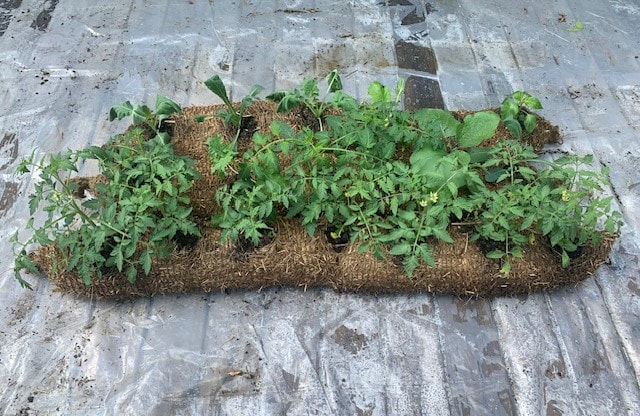PORTABLE GARDENING LOGS (PGLs)
Portable Gardening Logs (PGLs) offer a practical, eco-friendly solution for gardening, reforestation, and ecosystem restoration. Whether used in urban environments to grow food and flowers or in disturbed natural habitats to support the regeneration of plant life and wildlife, PGLs help restore ecological balance and foster sustainability. They are versatile, easy to implement, and provide significant benefits to both urban and rural restoration projects. Below is an overview of their diverse applications and benefits:
1. Urban Gardening and Agriculture
Portable Gardening Logs are an excellent tool for urban gardening on balconies, rooftops, and other limited spaces. In cities where land is scarce, PGLs provide a way for urban dwellers to grow fruits, vegetables, and flowers in small areas. The logs can be placed in gardens or containers, offering a stable base for plants to grow while also providing a natural, eco-friendly material that supports the health of the plants.
2. Restoration of Disturbed Ecosystems
In areas where natural vegetation has been disrupted due to logging, drought, wildfires, mining, agricultural activities, or urban development, Portable Gardening Logs can be an effective tool for restoration projects. The logs are designed to help restore damaged ecosystems by mimicking the function of natural logs in forests, which provide essential nutrients, shelter, and habitats for a range of species.
3. Reforestation and Soil Restoration
PGLs are particularly useful in reforestation efforts, especially in regions where the native vegetation has been severely impacted. When used in combination with native plants and trees, these logs help to stabilize the soil, create a micro-habitat, and facilitate the regrowth of a more diverse plant community.
Regeneration of vegetation: PGLs can provide a stable and nutrient-rich environment for newly planted trees and shrubs, encouraging their growth and increasing the chances of successful restoration.
Forest floor enrichment: In forested areas, the logs act similarly to fallen trees in natural forests, which are critical for enriching the forest floor and providing nutrients for new plants.
4. Sustainable and Eco-friendly
Portable Gardening Logs are designed to be eco-friendly and sustainable, making them an ideal tool for projects that focus on environmental restoration and conservation. They are made from natural materials, which not only help the plants and ecosystems they are placed in but also align with sustainable gardening practices. PGLs do not contribute to pollution or harmful waste and naturally decompose over time, adding nutrients back into the soil.
Portable Gardening Logs (PGLs) offer a practical, eco-friendly solution for gardening, reforestation, and ecosystem restoration. Whether used in urban environments to grow food and flowers or in disturbed natural habitats to support the regeneration of plant life and wildlife, PGLs help restore ecological balance and foster sustainability. They are versatile, easy to implement, and provide significant benefits to both urban and rural restoration projects. Below is an overview of their diverse applications and benefits:
1. Urban Gardening and Agriculture
Portable Gardening Logs are an excellent tool for urban gardening on balconies, rooftops, and other limited spaces. In cities where land is scarce, PGLs provide a way for urban dwellers to grow fruits, vegetables, and flowers in small areas. The logs can be placed in gardens or containers, offering a stable base for plants to grow while also providing a natural, eco-friendly material that supports the health of the plants.
- Fruits and vegetables: PGLs help create small gardens where fresh produce can thrive, even in densely populated areas.
- Flowers: Urban spaces, including balconies and rooftops, can be transformed into beautiful flower gardens, improving air quality and aesthetics.
- Companion planting: PGLs support diverse plant life by providing a natural growing medium that encourages companion planting, which can enhance plant health and yield.
2. Restoration of Disturbed Ecosystems
In areas where natural vegetation has been disrupted due to logging, drought, wildfires, mining, agricultural activities, or urban development, Portable Gardening Logs can be an effective tool for restoration projects. The logs are designed to help restore damaged ecosystems by mimicking the function of natural logs in forests, which provide essential nutrients, shelter, and habitats for a range of species.
- Soil regeneration: By being placed in degraded soils, PGLs assist in the restoration of soil health by promoting water retention, reducing erosion, and supporting microbial life.
- Wildlife habitats: PGLs help create habitats for small animals, insects, and birds, which are essential for biodiversity in the restored areas.
- Water retention and erosion control: In areas affected by erosion or drought, the logs can help slow down water runoff, allowing moisture to be absorbed into the soil and preventing further degradation.
3. Reforestation and Soil Restoration
PGLs are particularly useful in reforestation efforts, especially in regions where the native vegetation has been severely impacted. When used in combination with native plants and trees, these logs help to stabilize the soil, create a micro-habitat, and facilitate the regrowth of a more diverse plant community.
Regeneration of vegetation: PGLs can provide a stable and nutrient-rich environment for newly planted trees and shrubs, encouraging their growth and increasing the chances of successful restoration.
Forest floor enrichment: In forested areas, the logs act similarly to fallen trees in natural forests, which are critical for enriching the forest floor and providing nutrients for new plants.
4. Sustainable and Eco-friendly
Portable Gardening Logs are designed to be eco-friendly and sustainable, making them an ideal tool for projects that focus on environmental restoration and conservation. They are made from natural materials, which not only help the plants and ecosystems they are placed in but also align with sustainable gardening practices. PGLs do not contribute to pollution or harmful waste and naturally decompose over time, adding nutrients back into the soil.
